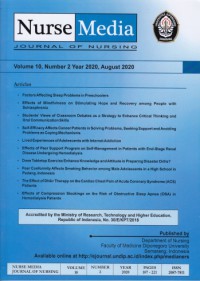
Jurnal
Peer Conformity Affects Smoking Behavior among Male Adolescents in a High School in Padang, Indonesia
Background: Peers contribute to the development of adolescents’ behavior during the transition period. Adolescents often justify their behavior with peers to confirm social norms of their surroundings. The increasing number of male adolescent smokers is raising public awareness to become acquainted with the cause of the behavior. Peer conformity is expected to be one of the vital variables to circulate smoking behavior.
Purpose: This study aimed to determine the correlation between peer conformity and smoking behavior among male adolescents in a high school in Padang, Indonesia.
Methods: A descriptive-analytical research design with a cross-sectional approach was used in this study. The samples were 154 male adolescents recruited by proportional random sampling. The data were collected using the questionnaires and analyzed using the Fisher exact test.
Results: The results showed a significant correlation between peer conformity and smoking behavior among male adolescents (p=0.000). Peer conformity contributed to the development of smoking behavior among adolescents in this study.
Conclusion: Peer conformity was evident to have a significant correlation with smoking behavior among male adolescents. Increasing assertiveness and life skill ability might be a necessity to adapt to negative behavior among adolescents.
Availability
No copy data
Detail Information
- Series Title
-
Nurse Media Journal of Nursing, Vol. 10 No. 2 August 2020
- Call Number
-
(05) 610.5 DEP n
- Publisher
- Semarang : Department of Nursing, Faculty of Medicine Diponegoro University., 2020
- Collation
-
Hlm. 191-199
- Language
-
English
- ISBN/ISSN
-
2087-7811
- Classification
-
(05) 610.5 DEP n
- Content Type
-
-
- Media Type
-
-
- Carrier Type
-
-
- Edition
-
Vol. 10 No. 2 August 2020
- Subject(s)
- Specific Detail Info
-
-
- Statement of Responsibility
-
-
Other version/related
No other version available
File Attachment
Comments
You must be logged in to post a comment
 Computer Science, Information & General Works
Computer Science, Information & General Works  Philosophy & Psychology
Philosophy & Psychology  Religion
Religion  Social Sciences
Social Sciences  Language
Language  Pure Science
Pure Science  Applied Sciences
Applied Sciences  Art & Recreation
Art & Recreation  Literature
Literature  History & Geography
History & Geography